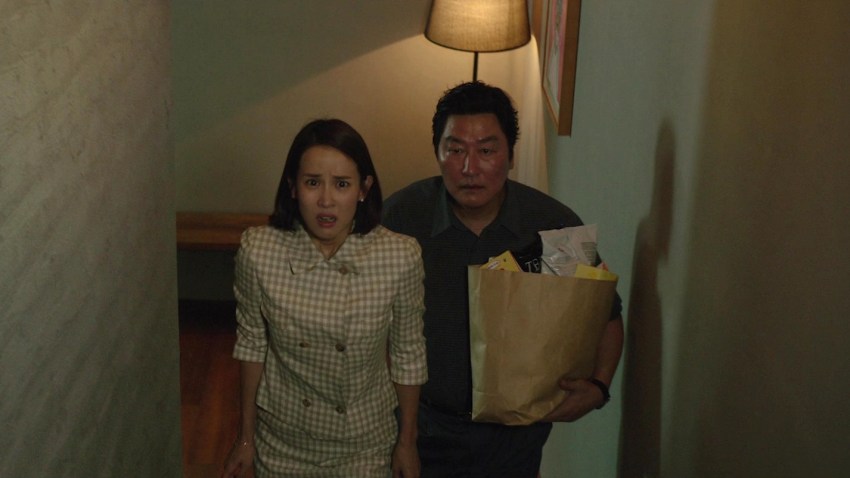
Is This Really The Best Movie Of The 21st Century?
When The New York Times first unveiled their list of The 100 Best Movies of the 21st Century, most people rightfully wondered which film the newspaper might single out for its number one pick.
Would it be a Hayao Miyazaki anime film like Spirited Away, Ponyo, or Howl’s Moving Castle, or would it instead be a rousing biopic like The Social Network? Would the topsy-turvy nature of Get Out launch Jordan Peele’s 2017 horror film to the top of the list, or would Paul Thomas Anderson’s epic vision for There Will Be Blood ultimately win out?
After days of furious debate among the online community, director Bong Joon-ho’s 2019 satirical social drama, Parasite, ultimately garnered the top prize from the prestigious publication. While some, like the current U.S. president, might not exactly agree with the film’s momentous place at the top of The New York Times’ list, most dedicated cinephiles had little reason to argue against Parasite’s extraordinarily high ranking.
Yet even then, it’s worth wondering what exactly makes Parasite so undeniably terrific in the first place. After all, any film that eclipses the critical esteem and popularity of Moonlight, Eternal Sunshine of the Spotless Mind, Boyhood, and No Country for Old Men is worth studying a bit more closely, right? From its socially relevant themes to its utterly shocking twists and turns, here is a detailed look as to why exactly Parasite is the best film of the 21st century yet.
Upper and Lower Classes Collide With Unexpected Results

Parasite largely revolves around the financially destitute Kim family, composed of patriarch Ki-taek (Song Kang-ho), his wife Chung-sook (Jang Hye-jin), and their young adult children Ki-jung (Park So-dam) and Ki-woo (Choi Woo-shik). Struggling to make a living via low-income jobs, the Kim family soon hatch a scheme to elevate themselves up the social ladder by finding work with the far more affluent Park family.
Masquerading as unrelated workers, the Kims manage to trick the Parks into believing that they’re simply ordinary household staff. As their employment at the house continues, however, the Kims soon uncover a number of surprising secrets about the Park household they never imagined possible.
Like all the best films – many of which just so happen to be mentioned on The NY Times’ list – it’s hard to put an exact label on Parasite when it comes to the movie’s genre. In essence, the finished film more closely aligns to a traditional social drama, complete with an in-depth look at the common issues of the contemporary day and age (poverty, the widening wealth gap, the dangers of an unbalanced capitalist system, etc.). Some critics have also labeled it a dark comedy, although most of the humor is more clever than it is outright comedic, possessing a sharp wit that can almost be described as embittered and acidic than laugh-out-loud funny.

Alternatively, some viewers and critics have likened it more closely to a thriller, with much of the movie’s second half moving into the realm of an almost Hitchcockian suspense film. (Something Bong Joon-ho, through his constant allusions to the Master of Suspense, hardly shies away from.)
In many ways, though, Parasite’s unwavering adherence to a clear-cut genre is part of its success. Packing in a whirlwind of surprises in its two-hour runtime, Parasite is able to veer left whenever audiences expect it’s headed right, something perfectly evidenced by the movie’s sudden plot twist halfway through the film. Rather than simply serving as yet another predictable thriller or a preachy social drama, Parasite mashes both genres together into one satisfying package, allowing it to gauge more serious issues without trivializing its topics or boring the average viewer.
Timely Themes, Sudden Surprises, and Brilliant Creative Storytelling
At first glance, most of Parasite’s favorable critical acclaim can be attributed to its magnetic storyline, with Bong consistently finding a way to topple viewers’ expectations whenever we seem to have a definitive idea formed about the kind of film we’re watching. But in theory, it’s the subtlety of the movie’s narrative itself, its timely themes and the things that go unsaid about the film, that make Parasite the unforgettable drama it is.
Rather than launching into an out-of-place tirade about the negative qualities of wealth, capitalism, and opposing social classes, Bong simply points the camera at the movie’s characters and encourages the narrative to speak for itself. As a result, audiences are left to form their own conclusions about the movie’s arguments, triggering a far more intellectually stimulating movie than your typical mainstream release.
Nowhere is this creative characteristic of Bong’s film more readily seen than the movie’s gut-wrenching ending, which sees the Kims’ teenage son Ki-woo map out a lifelong career in order to free his father from the former Park residence. Watching this ambiguous narrative unfold, viewers are encouraged to reflect on the two distinct possibilities behind the plan: either Ki-Woo will rise above his family’s impoverished background and obtain vast wealth, or the limitations of his social upbringing will prevent him from ever rescuing his father.
At the end of the day, whether the film has a positive or negative ending depends entirely on the viewer, as well as their individual interpretations of the movie’s plot and their thoughts on capitalism, wealth, and social classes in general. And therein lies the genius of Parasite. By refusing to spell things out for viewers in a clear-cut fashion, the movie affords us a chance to engage with the film’s narrative in a more meaningful way, resulting in a disorienting, entertaining, altogether satisfying drama unlike anything else we’ve seen in the 21st century to date.
Watch Parasite on Netflix and HBO Max.











